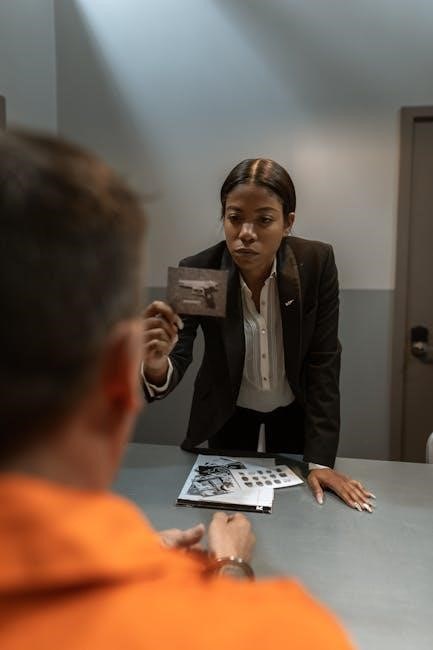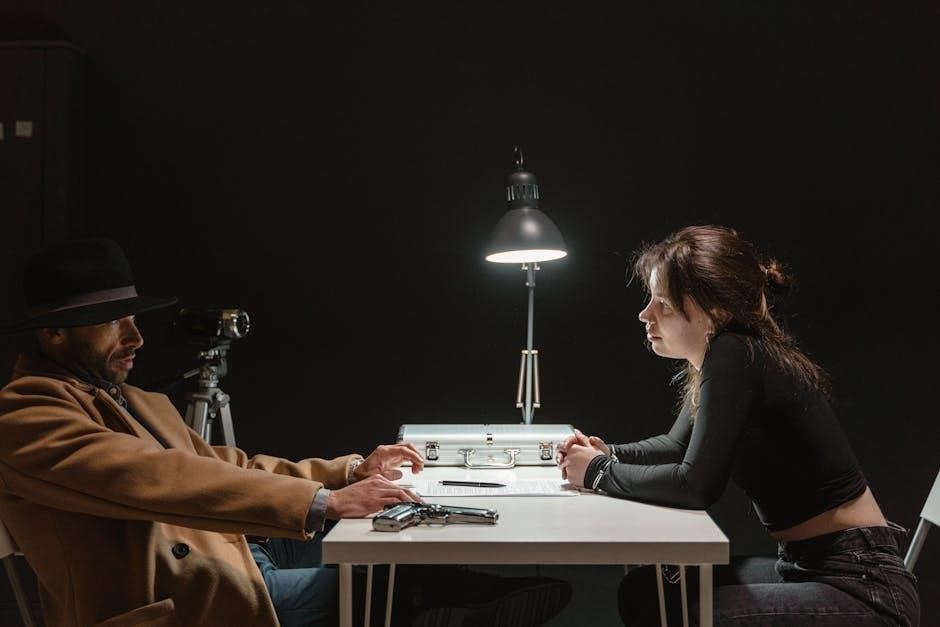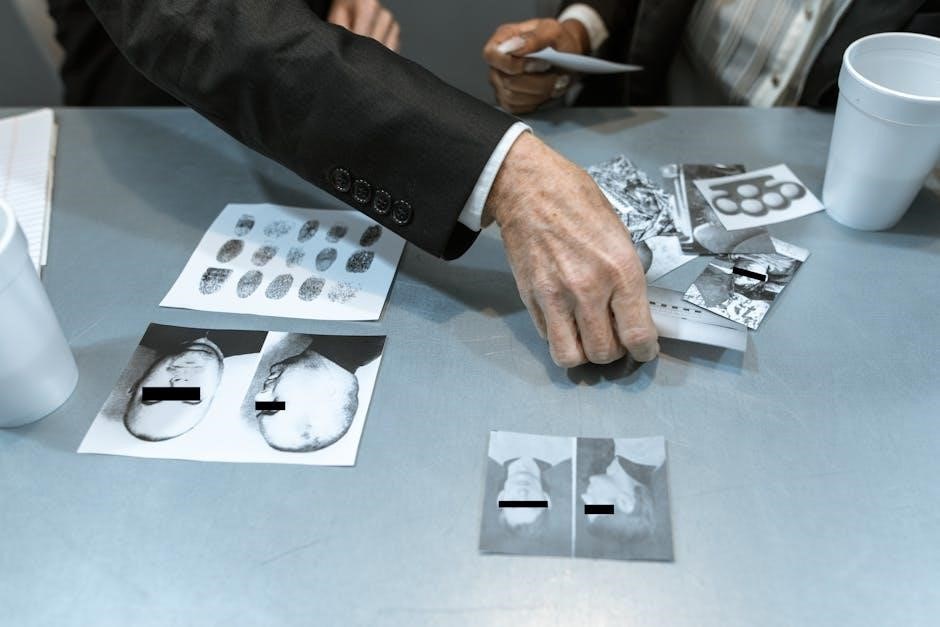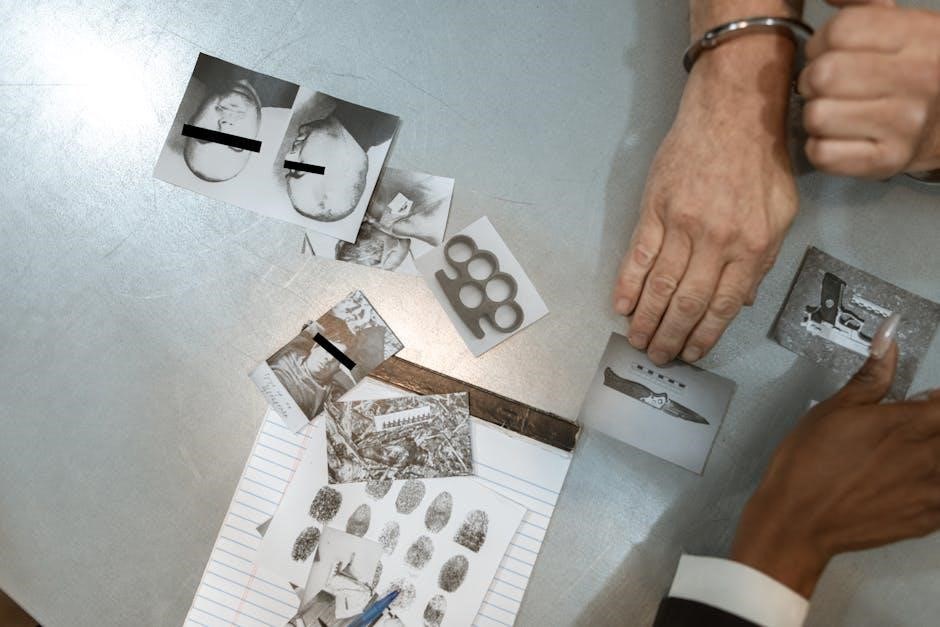A mock trial criminal case simulation educates students about legal proceedings, criminal law, and courtroom roles. It enhances understanding of the justice system through interactive participation.
What is a Mock Trial?
A mock trial is a simulated court proceeding that replicates a real trial, often focusing on criminal or civil cases. It involves participants playing roles such as judge, prosecutor, defense attorney, witnesses, and jury members. This interactive exercise is commonly used in educational settings to teach students about legal concepts, courtroom procedures, and critical thinking. Mock trials are designed to be engaging and educational, allowing participants to gain hands-on experience with the legal system. They often involve prepared scripts or case materials, ensuring a structured and realistic experience. The goal is to foster a deeper understanding of how trials work and the roles of legal professionals. Mock trials are widely used in schools, universities, and legal training programs to promote civic literacy and practical skills.

The Importance of Criminal Law in Mock Trials
Criminal law plays a central role in mock trials, as it provides the legal framework for simulating real-life court proceedings. Mock trials focusing on criminal cases teach participants about key legal concepts, such as evidence presentation, due process, and the burden of proof. These simulations help students understand the differences between criminal and civil law, emphasizing the state’s role in prosecuting crimes. By engaging with criminal case materials, participants gain insights into legal procedures, ethical dilemmas, and the consequences of legal decisions. Mock trials also foster critical thinking and public speaking skills, preparing students for careers in law and related fields. The hands-on experience with criminal law principles makes mock trials an invaluable educational tool for fostering civic literacy and legal awareness.
Key Components of a Mock Trial
Key components of a mock trial include roles, evidence, and courtroom procedures, mirroring real legal processes to educate participants effectively.
Roles in a Mock Trial

In a mock trial, essential roles include the judge, who presides over the trial; the prosecutor, presenting the case against the defendant; and the defense attorney, arguing for the defendant’s innocence.
Additional roles are witnesses, providing testimony, and the bailiff, managing courtroom procedures.
Participants may also portray jurors, evaluating evidence to reach a verdict.
Each role requires understanding of legal concepts and procedures, fostering engagement and learning.
These roles collectively simulate real courtroom dynamics, preparing students for legal professionals’ responsibilities.
Mock trials encourage teamwork, critical thinking, and public speaking skills while educating participants about the justice system.
Structure of a Criminal Case Mock Trial
A criminal case mock trial typically follows a structured format, mirroring real-life legal proceedings. It begins with opening statements, where the prosecution and defense present their case overviews.
Witness testimonies follow, allowing both sides to question witnesses and present evidence.
Cross-examination enables opposing counsel to challenge testimony, ensuring thorough scrutiny of the facts.
After all evidence is presented, closing arguments summarize each side’s position, highlighting key points for the jury.
The trial concludes with jury deliberation, where the verdict is determined, and the judge announces the outcome.
This structured approach ensures students understand the sequential nature of criminal trials, fostering a clear grasp of legal processes and their practical application.

Educational Value of Mock Trials
Mock trials enhance critical thinking, public speaking, and teamwork while fostering a deep understanding of the legal system and its practical applications in real-world scenarios.

Teaching Legal Concepts Through Mock Trials
Mock trials are an effective way to introduce students to fundamental legal concepts, such as criminal law, civil law, and the differences between them. By participating in simulated criminal cases, students gain hands-on experience with legal terminology, court procedures, and the roles of key stakeholders like prosecutors, defense attorneys, judges, and witnesses. These activities help students understand the structure of a trial, including opening statements, witness testimonies, and the presentation of evidence. Mock trials also emphasize the importance of rules of evidence and due process, ensuring a fair and just proceeding. Through these exercises, students develop a deeper appreciation for how the legal system operates and how it applies to real-world scenarios, making complex legal ideas more accessible and engaging.
Developing Critical Thinking and Public Speaking Skills
Mock trials are a powerful tool for fostering critical thinking and public speaking skills. Participants engage in analyzing cases, formulating arguments, and articulating their positions clearly. The dynamic nature of trials requires quick thinking and adaptability, as students must respond to questions and challenges in real-time. Public speaking skills are refined through opening statements, cross-examinations, and closing arguments, helping students become more confident and articulate. Additionally, mock trials encourage teamwork, as participants collaborate to build a cohesive case. These experiences not only enhance verbal communication but also teach students to think strategically and persuasively, skills that are invaluable in both legal and everyday contexts. By simulating real-world legal scenarios, mock trials provide a practical platform for personal and intellectual growth.
Preparing for a Mock Trial
Preparing for a mock trial involves evaluating case materials, assigning roles, and practicing courtroom procedures to ensure a realistic and educational simulation of legal proceedings.
Understanding the Case Materials
Understanding the case materials is essential for a successful mock trial. These materials typically include witness statements, legal authorities, and procedural guidelines. Participants must thoroughly review the case details, including the alleged crime, evidence, and legal arguments. This step ensures a realistic simulation, as students grasp the legal concepts and roles involved. By analyzing the materials, teams can prepare effective questioning strategies and courtroom presentations; The case materials also outline the rules of evidence and trial procedures, helping participants understand how criminal cases are conducted in real courts. This foundational step ensures that the mock trial is both educational and engaging, fostering a deeper understanding of criminal law and legal processes.
Assigning Roles and Responsibilities
Assigning roles and responsibilities is crucial for a structured mock trial. Each participant takes on a specific role, such as prosecutor, defense attorney, defendant, or witness. The judge oversees the trial, ensuring procedural accuracy. Witnesses provide testimony based on case materials, while attorneys prepare opening statements and cross-examination questions. The bailiff manages courtroom procedures, and the clerk records key details. Assigning these roles ensures active engagement and helps students understand the functions of legal professionals. Clear role definitions promote organization and realistic simulations, enabling participants to develop public speaking and critical thinking skills. Effective role assignment fosters a collaborative learning environment, enriching the educational experience of mock trial criminal cases.
Conducting the Mock Trial
The mock trial begins with the bailiff calling the court to order, followed by opening statements, witness testimonies, cross-examination, and evidence presentation; The jury then deliberates and delivers a verdict.

Opening Statements and Witness Testimonies
The mock trial commences with the bailiff calling the court to order, followed by the judge presiding over the case. The prosecutor and defense attorney deliver opening statements, outlining their arguments and evidence. Witnesses are then called to testify, providing factual accounts and expert opinions. Attorneys question witnesses to establish credibility or challenge their testimonies. The prosecution presents its case first, followed by the defense. This phase emphasizes the importance of clear communication, evidence presentation, and legal strategy. Students learn to articulate arguments persuasively and think critically about the credibility of testimonies. This interactive process mirrors real trials, fostering a deeper understanding of criminal procedure and the adversarial system. It also highlights the role of evidence in shaping the case narrative and influencing the jury’s decision.
Cross-Examination and Evidence Presentation
Cross-examination is a pivotal phase in mock trials where attorneys challenge the credibility of opposing witnesses. Prosecutors and defense attorneys present evidence, such as documents, testimonies, and physical items, to support their arguments. Students learn to articulate questions strategically, ensuring relevance and adherence to legal standards. The adversarial nature of this phase mirrors real trials, emphasizing the importance of preparedness and critical thinking. Evidence presentation must be clear and persuasive, as it directly impacts the jury’s perception of the case. This process teaches participants about the legal standards for evidence admissibility and the techniques used to challenge or uphold witness credibility. It also underscores the role of evidence in shaping the narrative of a criminal case and influencing the final verdict.
Deliberation and Verdict
Deliberation and verdict are the climax of a mock trial, where the jury reviews evidence and testimonies to reach a decision. The jury discusses the case, weighing the prosecution’s and defense’s arguments, and applies legal standards to determine guilt or innocence. In criminal cases, the verdict must be unanimous or meet specific legal thresholds. The judge then announces the verdict, and if guilty, may outline potential consequences. This phase teaches students the gravity of decision-making in the legal system and the importance of impartiality. It also highlights the impact of evidence and arguments on the outcome, reinforcing the skills of critical analysis and collaborative decision-making.

Debriefing and Reflection
Debriefing involves discussing the trial’s outcome and legal implications, while reflection focuses on evaluating performance and learning outcomes to improve future mock trial experiences.
Discussing the Outcome and Legal Implications
Debriefing sessions focus on analyzing the trial’s outcome, exploring whether the verdict aligns with the law and evidence presented. Students discuss the legal implications of the case, such as the application of criminal statutes and potential consequences for the defendant. This reflection helps participants understand how legal principles shape real-world outcomes. Additionally, it encourages critical thinking about the fairness and effectiveness of the justice system. By connecting the mock trial to actual legal processes, students gain a deeper appreciation of the role of law in society and the importance of upholding justice.
Evaluating Performance and Learning Outcomes
Evaluating performance and learning outcomes in mock trials involves assessing how well participants understood and applied legal concepts, critical thinking, and public speaking skills. Teachers and judges often provide feedback on role execution, evidence presentation, and argumentation. Students reflect on their performance, identifying strengths and areas for improvement. Learning outcomes are measured by the depth of understanding students gain about criminal law, courtroom procedures, and the justice system. This evaluation helps reinforce key skills like advocacy, collaboration, and analytical reasoning, ensuring students achieve the educational goals of the mock trial experience.